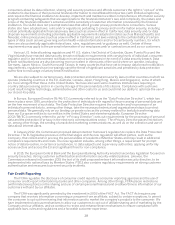American Express 2015 Annual Report Download - page 29
Download and view the complete annual report
Please find page 29 of the 2015 American Express annual report below. You can navigate through the pages in the report by either clicking on the pages listed below, or by using the keyword search tool below to find specific information within the annual report.
currency) at the point of sale, and submitting the transaction in the cardholder’s billing currency, thus bypassing the
traditional foreign currency conversion process of the card network. Some merchants also offer this option to
customers. This practice is known as “dynamic currency conversion.” Our policy generally requires merchants to
submit charges and be paid in the currency of the country in which the transaction occurs, and we convert the
transaction to the Card Member’s billing currency.
In addition to the discussion in this section, see “Our operating results may suffer because of substantial and
increasingly intense competition worldwide in the payments industry” in “Risk Factors” for further discussion of the
potential impact of competition on our business, and “Ongoing legal proceedings regarding provisions in our merchant
contracts could have a material adverse effect on our business, result in additional litigation and/or arbitrations, subject
us to substantial monetary damages and damage to our reputation and brand” in “Risk Factors” for a discussion of the
potential impact on our ability to compete effectively if ongoing legal proceedings limit our ability to prevent
merchants from engaging in various actions to discriminate against our card products.
Global Network & Merchant Services — Regulation
Legislators and regulators in various countries in which we operate have focused on the operation of card
networks, including through antitrust actions, legislation and rules that would or do impose changes on pricing or
practices of card issuers, merchant acquirers and payment networks, and the establishment of broad and ongoing
regulatory oversight regimes for payment systems. Regulators and legislators have focused on the fees merchants
pay to accept cards, including the way bankcard network members collectively set the “interchange” (that is, the fee
paid by the bankcard merchant acquirer to the card issuer in payment networks like Visa and MasterCard), as well as
the rules, contract terms and practices governing merchant card acceptance. Although, unlike the Visa and
MasterCard networks, the American Express network does not have interchange fees or collectively set fees or rules,
antitrust actions and government regulation relating to merchant pricing or terms of merchant rules and contracts
could affect all networks directly or indirectly, as well as adversely impact consumers and merchants. Among other
things, lower interchange and/or merchant discount revenue may lead card issuers to look for other sources of
revenue from consumers such as higher annual card fees or interest charges, as well as to reduce costs by scaling
back or eliminating rewards, services or benefits to cardholders and merchants.
In certain countries where regulations have required our competitors to lower their fees, we have made
adjustments to our pricing to merchants to reflect local competitive trends. For example, reductions in bankcard
interchange mandated by the Reserve Bank of Australia in 2003 resulted in lower merchant discount rates for Visa
and MasterCard acceptance. As a result of these regulation-driven changes in the marketplace, we reduced our own
merchant discount rates in Australia over time, although we have been able to increase billed business and the number
of merchants accepting our cards. We have also experienced selective, but increasing, merchant surcharging on our
cards in certain industries and, in some cases, on a basis that is greater than that applied to cards issued on the
bankcard networks, which is known as differential surcharging. The Australian surcharging standards allow us and
other networks to limit merchant surcharges to “the reasonable cost of card acceptance.” This could lead to
differential surcharging of American Express cards if a surcharging merchant takes the position that the cost of
American Express acceptance is higher than that of other payment cards.
Following a formal review of the regulatory framework for card payments in Australia, the Reserve Bank of
Australia published a consultation paper on December 3, 2015, proposing new regulations, including the following:
• The inclusion of our GNS business in Australia under interchange regulation, which would subject GNS
payments to bank partners to the same interchange caps that apply to Visa and MasterCard in Australia
• Broadening interchange fee caps to include all amounts payable to card issuers in regulated payment systems
as well as other payments to card issuers across both three- and four-party card payment networks
• Introducing a maximum interchange fee cap, increasing the frequency of periodic weighted-average benchmark
calculations and including all transactions at Australian merchants in benchmark calculations (thereby
capturing foreign-issued cards, which had previously been excluded)
• Changing the rules on merchant surcharging to limit surcharging to the actual costs of card acceptance paid to
the merchant acquirer, as recorded on the merchant statement issued by the merchant acquirer
Responses to the consultation paper were due by February 3, 2016. We do not expect any changes to take effect
before mid-2016.
In the European Union, the Payment Services Directive (“PSD”), adopted in 2007 and subsequently implemented
by EU Member States, prescribes common rules across the EU for licensing and supervision of payment services
providers, including card issuers and merchant acquirers, and for their conduct of business with customers. The
objective of the PSD is to facilitate the operation of a single internal payments market in the EU through harmonization
of EU Member State laws governing payment services. One provision of the PSD permits merchants to surcharge,
subject to disclosure requirements, but also allows individual Member States to override this rule by prohibiting or
limiting surcharging. To date, the Member States are split on whether they prohibit or permit surcharging, with
countries such as the United Kingdom (which for a number of years has permitted it for credit card purchases), the
18
























